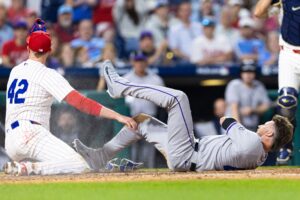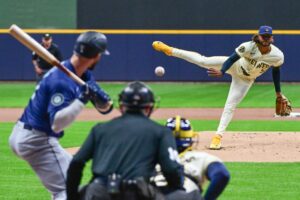Comebacks do not always favor the teams with Cinderella slippers adorning their feet. Sometimes, the squadrons that have launched themselves into the stratosphere are the subjects. This is especially true of today’s team, the Arizona Diamondbacks. If you are a baseball fan and have any access to YouTube, you have probably seen highlights of this game. It’s one of this writer’s personal favorites, despite not being an active follower of either team involved. The game is worth reliving both for its incredible pitching and massive offensive explosion. It’s a contest where a pitcher was credited with a blown save…in the seventh inning! Another pitcher gave up four runs and kept his ERA from going any higher! However, the true drawing power of this game is the 10th inning.
Extra inning comebacks are a special breed. They exist in their own little world, waiting for us to come and unlock them. It’s almost like digging around in the attic of one’s grandparents, searching for some lost emblem of familial greatness. Treasures abound within this particular category, and no list of terrific comebacks would be complete without one. Thankfully, Baseball Reference’s chances of winning statistic agrees with this philosophy. Without it, we’d be devoid of one of the greatest extra-inning comebacks of all time.
September 27, 2011: Los Angeles Dodgers vs. Arizona Diamondbacks
The year 2011 was a much different time in the National League West. Fans everywhere have come to know the Los Angeles Dodgers as the dominant force in that division. However, in this season, they were looking up at the Diamondbacks. In fact, Arizona would finish the season 11 ½ games in front of Los Angeles. That’s not to say that the Dodgers were a bad team. Far from it, in fact. An emerging Clayton Kershaw won 21 games and his first career Cy Young Award. He also posted a 2.28 ERA and struck out a staggering 248 batters. A WHIP of 0.977 and an ERA+ of 161 added to his resume. He was supported by Hiroki Kuroda who, despite posting a losing record, had an ERA around three and an ERA+ of 120. The Dodgers also had a terrific bullpen, led by closer Javy Guerra (2.31 ERA, 21 SV, 160 ERA+). The offense was middling, but Matt Kemp did have a monster year (.324 avg, 39 HR, 126 RBI, 40 SB, 172 OPS+).
For the Diamondbacks, 2011 was something special. With an overall record of 94-68, they easily won the division title. It was all thanks to one thing: the home run. They finished fourth in the NL with 172 homers. Justin Upton led the charge with 31 and a .289 average. He also had the highest OPS+ on the team (141). Joining him were catcher Miguel Montero (.282 avg, 18 HR, 121 OPS+) and Gerardo Parra (.292 AVG, 130 H, 113 OPS+). Chris Young posted 20 homers and Ryan Roberts had 19. Overall, the pitching was statistically worse than the Dodgers. However, the Diamondbacks boasted a 21 game-winner of their own in Ian Kennedy. They also had a lockdown closer in J.J. Putz (2.17 ERA, 45 SV, 182 ERA+). In short, Arizona blasted their way to a division title. This is notable as today’s story revolves around one of the most famous grand slams in team history.
A Pitcher’s Duel to Begin
In late September of 2011, the Dodgers and Diamondbacks met in what were essentially meaningless contests. Arizona had claimed the division crown already, leading by eight games with only two remaining. They send Jarrod Parker to the mound to face the veteran Kuroda. The two fought into the sixth inning, trading zeroes back and forth. Nine hits were given up between the two, but no cleat touched home plate. Then the bullpens went at it. In the top of the seventh, Ryan Cook came on to face the Dodgers. After putting two on base, he was taken down as Diamondbacks manager Kirk Gibson returned to his bullpen. Alberto Castillo was called upon and promptly got the second out of the inning. Up stepped Dee Strange-Gordon, who picked up an RBI hit. However, he was thrown out at second base, costing the Dodgers a potentially critical run-scoring opportunity. The Diamondbacks answered in the bottom of the inning after Chris Young walked and Lyle Overbay doubled him home.
Extra Inning Comebacks: The Fireworks of Baseball
Then, the bullpens went at it until, tied at one, the game was forced into extra innings. In the top of the 10th, the Diamondbacks sent Micah Owings to the mound. Strange-Gordon led off the inning with a double. Jerry Sands followed that with a sacrifice bunt. In haste, Owings threw the ball away, allowing Strange-Gordon to score and make it 2-1 Dodgers. Kemp followed this up with an RBI hit and moved to second on an error by the center fielder Young. Later in the inning, James Loney and A.J. Ellis picked up RBI hits. All told, the Dodgers scored five times and led 6-1 going to the bottom of the 10th. In extra-inning affairs, sudden comebacks by the home team are few and far between. The Diamondbacks found themselves in this position.
Los Angeles sent Blake Hawksworth, a third-year reliever, out to start the inning. He got two quick outs before Cole Gillespie picked up an infield hit. Montero followed that up with another hit, moving Gillespie to third. Young would then walk, loading the bases for pinch hitter John McDonald. He chopped one up the third baseline, but third baseman Aaron Miles booted the play. A run scored, making it 6-2. That brought out Dodger manager Don Mattingly, who brought Guerra in. A seven-pitch battle between himself and Aaron Hill resulted in a bases-loaded walk, plating the third Diamondback run. Out came Ryan Roberts, who was 0-4 on the night. He promptly walloped the first pitch he saw into the left-field seats for a game-winning grand slam. Final score: Diamondbacks 7, Dodgers 6.
Comebacks: Not Always the Cinderella Story
In one swing of the bat, the Diamondbacks went from a 5% chance of winning to a 100% chance. In this writer’s opinion, this is what makes comebacks in baseball better than any other sport. There’s always a chance that the game will turn in a massive fashion. One swing, one bad pitch, one stolen base…anything is possible. Baseball is, in turn, enriched by this idea of permanent hope. No matter how badly a team is losing, their fans can always hold out faith for one of these comebacks. This is true, no matter the record or the team favorited to win, as seen in this example. Extra inning comebacks may be rare, but when they happen, they are among the most exciting moments in the sport.
Main Photo:
Embed from Getty Images
Players Mentioned:
Clayton Kershaw, Hiroki Kuroda, Javy Guerra, Matt Kemp, Justin Upton, Miguel Montero, Gerardo Parra, Chris Young, Ryan Roberts, Ian Kennedy, J.J. Putz, Jarrod Parker, Ryan Cook, Alberto Castillo, Dee Strange-Gordon, Lyle Overbay, Micah Owings, Jerry Sands, James Loney, A.J. Ellis, Blake Hawksworth, Cole Gillespie, John McDonald, Aaron Miles, Aaron Hill






